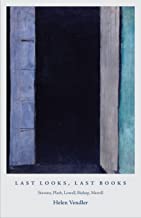Last Looks, Last Books: Stevens, Plath, Lowell, Bishop, Merrill by Helen Vendler 2010
Helen Vendler, honored at Harvard by being named a University Professor, is a literary critic whose work has focused on 20th C. American poets. This book presents the five lectures she gave in 2007 as the Mellon Lectures at the National Gallery of Art in D.C.
The theme of how poets address their inevitable and imminent death is one that has attracted great critics. Harold Bloom’s book ‘Til I End My Song: A Gathering of Last Poems’ also published in 2010 cast a broad net presenting a final or near-final poem by 100 influential poets from 16th C. Edmund Spenser to the 21st C. Agha Ali. Bloom includes work by four of the five poets Vendler discusses, omitting only Plath. Another writer, Katie Rophie in her book The Violet Hour: Great Writers at the End’ explores how five writers dealt with their approaching mortality, including Dylan Thomas.
Vendler addresses her theme through the metaphor of binocular vision, how a poet combines the still vigorous mental engagement with the world with the inevitable physical decline and the knowledge that his/her life is approaching its end, or as she puts it in the Introduction, “The poet, still alive but aware of the imminence of death, wishes to enact that deeply shadowed but still vividly alert moment (the “last look” of the Irish); but how can the manner of a poem do justice to both the looming presence of death and the unabated vitality of spirit”. Vendler then spends five chapters/lectures exploring that question in the work of Wallace Stevens (1879-1955), Sylvia Plath (1932-1963), Robert Lowell (1917-1977), Elizabeth Bishop (1911-1979) and James Merrill (1926-1995).
By focusing on a few poems for each writer and by implementing close reading and in depth analysis of form, metaphor, and language, Vendler opened my eyes and my mind to an entirely new level of interpretation of poets whom I thought I knew fairly well. The writing is occasionally turgid and too, too academic, but the occasional slog is worth it because when she is on her game, she writes beautifully. Here’s an example of her writing craft as she, like Nabokov in the first line of his memoir ‘Speak Memory’, alludes to the darkness both before birth and after death: “The Plain Sense of Things’ is a post-elegiac poem (by Wallace Stevens). Everything one cared about is already gone, and in that moment we are suddenly aware that there had existed, earlier in life, a comparable blank moment before we encountered our loved places, people, and possessions. Externally, then, there is a return to that earlier blankness, but internally we experience, in comparing the blanknesses, not a simple acquiescent return to a former uninvestigated desolate condition, but rather our need to name and enumerate our losses—-and then to pose the required and inevitable query, seeking and acquiring a new knowledge of deprivation.”
As I am now closer to 80 than I am to 70, this book spoke to me as did Bloom’s and Rophie’s. Here’s Vendler quoting Robert Lowell from ‘Day to Day’: “Past fifty, we learn with surprise and a sense/of suicidal absolution/that what we intended and failed/could never have happened—-/and must be done better.” The world depends on our writers and artists to help us tolerate, if not understand, the human condition which too often is colored by pain, loss, and sadness ( witness today’s Ukraine) followed by the obliteration of death.
Vendler’s slim volume will not be of interest to most, but I found it to be worth the effort and at the end of the final chapter, another affirmation of why reading is so important. If you love poetry, give it a try.



